#their entire 50+ years of friendship in a nutshell
Explore tagged Tumblr posts
Text
Interviewer: So are you two friends?
Peter: Yes!
Mike: No.
#The Monkees#Peter Tork#Michael Nesmith#incorrect quotes#c: irl#their entire 50+ years of friendship in a nutshell
39 notes
·
View notes
Text
My Online Communities
It’s no secret that although Facebook is the most popular social networking site with over 2.3 billion active users, and was once the must have social media site, it has kind of become synonymous with middle-aged women over-sharing, re-runs of the same old Tasty videos, and pretty much just ad-central. Though one of the longest standing social networks and clearly the front runner when it comes to longevity and popularity, the site is full of affordances and constraints, with the majority of them, constraints as many argue that Facebook is pretty outdated - but I’m here to argue the opposite. I have more recently become aware of some of the innovative ways people have adapted Facebook’s widespread “popularity” - as let’s face it, it’s hard to find anyone under the age of 50 that doesn’t have their own Facebook account. And though young people may argue that this is a huge constraint (because who wants their nosey Auntie spying on their every move?) the fact that people of all ages, from all walks of life is actually, when it comes to online communities, is a huge affordance.
Facebook is being adapted in really innovative ways to keep up with the times and provide us with communicative tools to achieve things that were never before possible. Pretty deep? Yes. True? Absolutely.
If you think I’m being a bit vague - I’m talking about online communities. Boyd and Ellison (2008) stated that social networking sites are “web based service[s] that allows individuals to... articulate a list of other users with whom they share a connection, and view and traverse their list of connections and those made by others within the system.” As soon as I read this I was reminded that I myself, am a member of three specific “online communities” in particular, each with their own very different purposes.
These groups and the media they share are rich in content, with the ability to react to posts, use polls and of course emojis, restricting the constraint of context and allow users to communicate how they are feeling with almost no ambiguity: this in itself has affordances and constraints - because I don’t think many people would be too pleased with a “sad” or “angry” react on a personal post, or a “haha” react on a sad story - so this can bring problems, but these are in the small minority. These little “reacts” are a great tool to eliminate the constraint of contextualisation and are used in my online communities consistently.

GIRLSMOUTH
Now girls, if you haven’t heard of this one, let me tell you, you’re missing out on some top quality entertainment. In a nutshell, Girlsmouth is a private Facebook group that is strictly girls only. At the time of writing this, the group has 171,146 members, consisting of four admins and six moderators, who monitor the comments of posts they have approved to ensure that there is no selling, promotion, or horrible comments being made. The “founder” of the group, Chloe Todd, describes the group as;
“an empowering support group for women to bring females together rather than bash each other. #girlpower 💁🏼”

The purpose of the group is for members to post for advice, gain support and build relationships with one another. All women are welcome which means that the posts come from women all over the globe, wealthy or struggling, young and old. An example of a post made today is below, within an hour already 28 people have commented offering advice, regardless of the transaction costs of the “conversation” and of over 170,000 people having the ability to see and judge them on their advice and experiences:

On the whole, the group is very supportive and many members have actually built real life friendships as a result of coming in contact on the site. It is not uncommon for women to post their struggles - whether that be regarding their health, relationship or financial struggles, and many will come to their aid, offering support and even in some examples, a place to stay, money to tide them over and offerings of friendship to people at their lowest points.
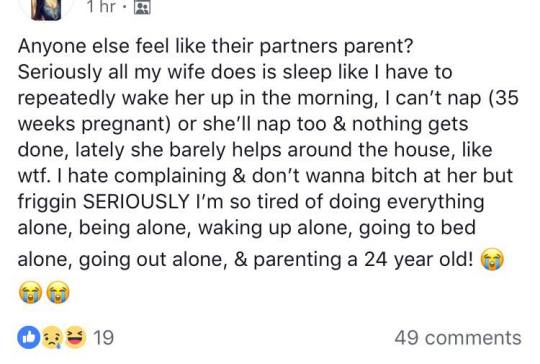
After being on the group for a while, you start to recognise names and faces and become familiar with people’s stories and struggles and even become a bit invested in some of the stories - a particular stand-out story to me is a girl that has been in hospital for over 13 months now, who has been sharing her story and the challenges shes faced.
Not all the stories are inspirational and moving, and to be honest, this is what I love most about this online community. When trying to find examples of posts to add it took me over thirty minutes to find at least five acceptable ones for an academic blog: I’m talking posts that didn’t mention polls on sexual encounters, disgusting flat mates and family meltdowns and every swear word in the book. As well as these, random questions about people’s favourite foods and make-up are regular features, but that’s all part of life too and really reiterates the idea that people come to Girlsmouth looking to connect and relate to others. I can guarantee now matter how wild or weird your story or post, there will be a group of women on Girlsmouth ready to relate to you. And that’s what makes Girlsmouth so great at what it does - and a huge source of entertainment.
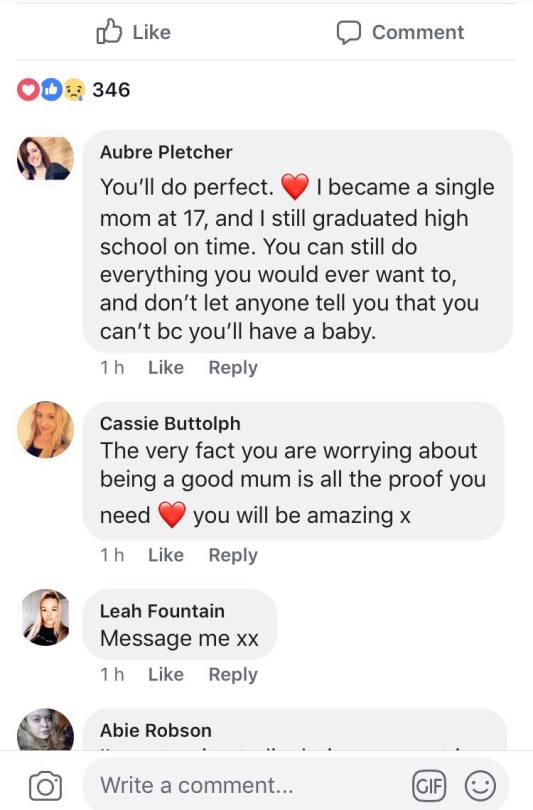
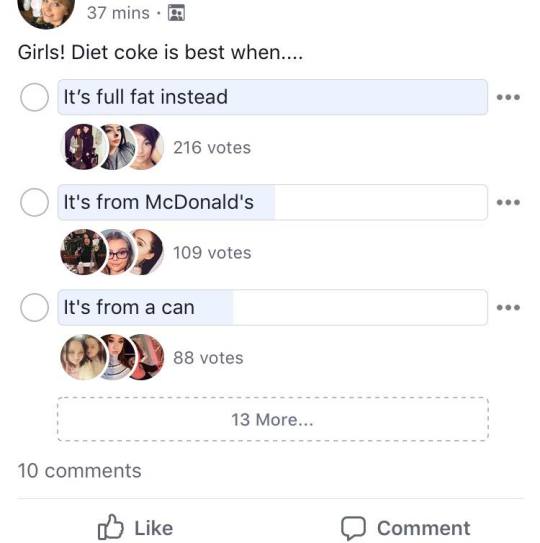
In summary, Girlsmouth is pretty much the best procrastination there is. But aside from that, it reminds us that whilst social media may be full of unattainable goals - whether this be in our appearance, holidays, relationships of financial situations, at the end of the day, we are all just human, and we could all do with a bit of advice and support sometimes - even if it is just about which Diet Coke tastes best (which is obviously full fat instead...)
READING WOMEN WALKING HOME
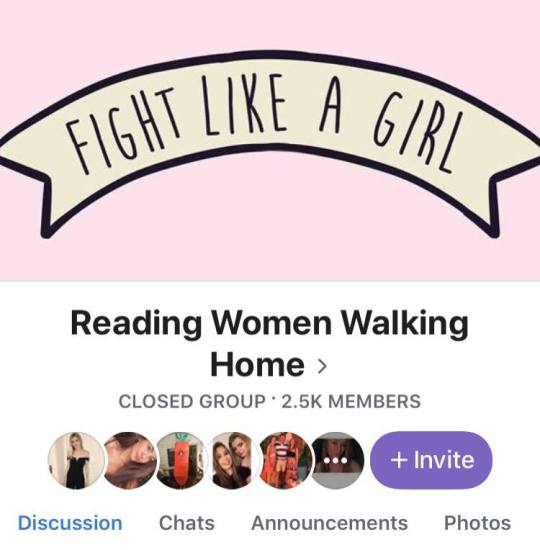
The second online community I am part of is a pretty new development, and if you live in Reading (which considering this is a university blog, is all of you) you need to join this group. With 2538 members, including University of Reading security team member Steve, this group was created with the purpose of warning other women about the strange and worrying behaviour of members of the public to ensure we can all stay safe. Unfortunately, there are multiple new posts daily, with women experiencing harassment, break-ins and burglaries on a daily basis.
Some may argue that this group does nothing but scaremonger, possibly stating that ignorance is bliss, as they say - but I couldn’t disagree more. As women it is our duty to stand together in the face of such adversities, and in a world where we are at risk simply from walking home from a lecture in the middle of the day, no precaution is too much. This feeling of support and community is exactly what we need when facing these issues.
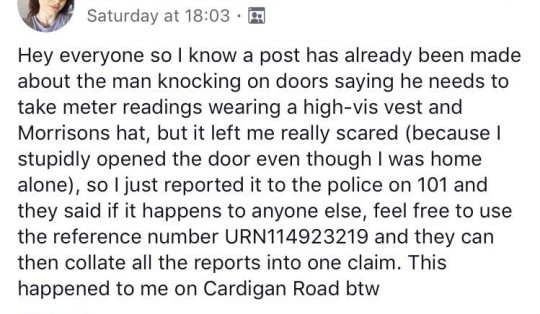
Thankfully, this support group is not just something that is happening at our university. The group was inspired by The Tab newspapers article on another “Women Walking Home” group chat. As well as a page for women to join, there is also a Facebook messenger group chat in which members are encouraged to message if they feel unsafe so another member can ring them on their walk home in another selfless offering of support, between women with weak and strong ties alike. Some may argue that this group isn’t entirely inclusive because it is heavily orientated towards females, but this doesn’t stop the group from being an online community, as these are defined as a tool to enable users to “ articulate a list of other users with whom they share a connection” (Boyd and Ellison, 2008) as aforementioned, and typically, males don’t get approached in this way. Males are present on the group as I have mentioned, in the form of the university security team. In fact, them joining the group could be a positive step, so that they are aware of what is going on, but this could also be negative as this could allow the members of the public who are engaging in this behaviour to become aware of the location of users and thus perpetuate the problem. So, in some cases, being inclusive of both genders is not of upmost importance.
This online community and utilisation of social media is a huge affordance of Facebook and social media, showcasing an amazing and innovative way to use the sites to stay safe. It’s also a great example of the constant development of social media and how we can use these advancements in everything we do. Which begs the question, is Facebook really as outdated and boring as everyone says?
LOST AND FOUND PETS IN BRISTOL/SOUTH GLOS

Finally, a group I have been a member of for a few years now: Lost and Found Pets in Bristol/South Gloucestershire. This group really epitomises the affordances of social media for me. With 30,208 members, this group is responsible for re-uniting thousands of lost, found and stolen pets with their owners, as well as re-homing pets with no where to go. The idea behind it is simple.
Lost an animal? Found an animal?
Simply post a picture, location or description and the tens-of-thousands of members will get to work for you.
Due to the longevity of the group, members and admin have a great relationship with one another, and its a recipe for success. Admin are aware of members and their location so that when an animal or pet goes missing or pops up in their area, someone can be on site ASAP. It really is as simple and effective as that. The admins are so invested in the page that they have been known to recognise pets that have gone missing years prior when their little furry face pops up on their feed - with one cat and owner being re-united after eight years! EIGHT! This group proves that miracles really can, and do, happen.
Never have I lost a pet (thank goodness) but the sheer thought of losing my dogs motivated me to join this group to ensure that if I ever do, I know that 30,000 people in Bristol are aware of it almost instantaneously and can assist in my search, with success. In 2015, 7000 pets were reunited with their owners from the group alone - even pets with no microchip are often re-united purely from the work of this group! If that doesn’t convince you that Facebook can be used for good, I don’t know what can. I think that it is a priceless and hugely innovative way to use social media - gone are the days of soggy “LOST” posters stapled to lamp-posts and trees and loss of reunion hope.
In summary, These communities are characterised by their complex nesting structure but this complexity and structure is what makes these groups so diverse, and so great: the variety of connections made possible by these communities is unparalleled. The media richness and participant framework within these groups, one many times a global level, allows users to be bound together by a common interest, concern or topic and though they may have no personal relationship with other users, referred to as weak ties, this factor doesn’t restrict their capacity to offer advice or engage in conversation, with mavens: who are people with access to things that are beneficial to others, and connectors: people who act as bridges for the facilitation of these things, working together to achieve positivity, costly or not.
These communities are the future of Facebook.
Dunbar’s number, who? We have thousands of online friends now.
Boyd, D., & Ellison, N. (2008). Social Network Sites: Definition, History, and Scholarship. Journal of Computer-Mediated Communication. 13, 210-230.
7 notes
·
View notes
Text
5 months post treatment: given the all clear, back to work and future plans!

I haven’t updated for a while but I’ve got lots of positivity to share. I’ve attached the above photo because of the truth in it. I don’t mean it in a egotistical way, but for those who know my journey and how far I have come, I want that to inspire others to never give up on recovering their health. I truly believe our bodies have the amazing ability to heal themselves, just as mine has done. That doesn’t mean the way I recovered my health will work for you, but it’s about finding the right combination of things that your body needs to trigger that healing.
I would also like to add the importance of not taking a doctors words or advice as gospel. My CFS Specialist (whom I hold in very high regard) told me that I would be lucky to reach 50% health and that would be as good as it’ll get for the rest of my life. Boy was he wrong. My Hansa dr and Osteo in Melbourne have opinions on treatments that I disagree with, so I do my own research and make up my own mind. You know your body better than anyone and in buddhism we are taught that “what you believe to be true, the opposite of that is also true, depending on time, place and circumstance.”
Here is where I’m at:
CURRENT LEVEL OF HEALTH/CURRENT TREATMENT I would say I’m at around 80% health now. Upon my first visit to Hansa almost 1 year ago, I would have said I was fluctuating between 40-60% health. My health is far more stable and consistent now too. I’m still on all my Hansa remedies and I could potentially be on them for another year. It’s really up to me how long I take them for. I feel worse on treatment because it is still doing stuff. On the days I don’t take treatment, I pretty much feel “normal.” Treatment can affect my mood and bring on depression, anxiety, anger, mood swings, along with physical symptoms such as nausea, fatigue, insomnia, organ pain and more.
I received some really good news from my Hansa Dr the other day. I sent him an email, enquiring about coming back for a third round of treatment in November this year. He responded that due to my current level of health, it is not recommended that I return, unless I start going backwards. He said at 80% health there are things I can now do at home to bridge that gap, rather than travelling all that way for such extreme treatment. I honestly cried when I read this. It was confirmation as to how well I really was doing and that all my hard work has paid off. I have worked really bloody hard to get to this level of health. Treatment is not easy, but neither is being sick. I truly believe that I can heal my body by implementing other strategies on my own now too.
Something amazing that happened 2 months ago, is that I was well enough to drive 8 hours to Canberra for my brother’s wedding. In the 9 years he’s lived there, I’ve never been well enough to visit him, not even to get on a plane. I drove the entire 8 hours by myself and spent a whole week surrounded by family, driving around, attending my brother’s wedding and then having to drive home. It was a massive achievement which boosted my confidence in knowing my body can now cope with something of that magnitude.
MENTAL/EMOTIONAL HEALING Something I still need to work on is releasing anger from my body. I read a book that explains the way you react to current circumstances is an indication of the emotions trapped in your body. I react very easily to situations with anger. I’m angry a lot and I’m very aware of it. I will do some more EMDR sessions but I’m hoping to find another method to help release these emotions from my body as they serve me no purpose.
Healing your mind I believe is big part of helping your body heal. Before leaving for Hansa I made sure I changed my attitude towards illness. I wanted to do all I could to detach from having an illness as part of my identity. My fear was that I subconsciously attached to my illness and my brain would not want to let go of that “story.” I really think I’ve detached from that way of thinking. I no longer say “I have Lyme Disease” or “I’m being treated for Lyme.” Anything that associates an illness with part of who I am, I will do my best to not verbalise or think. I will say to people if it comes up “I’m having treatment.” If they ask what for I would say “Lyme Disease.” But that doesn’t attach it to my identity in the same was as saying “I have/I’m being treated for...” I don’t follow any Lyme groups on facebook. My dad was sending me emails about updates on Lyme research in America and I asked him to not do that anymore. I honestly don’t want to associate with it at this time because it serves no purpose to my recovery. I would much rather have the thoughts of feeling well and living a normal life than having a constant reminder of my past or something I am trying to heal from.
Our brain is a huge contributor to whether we stay stick or get well. Dr Jernigan wrote an article about it. Our brain creates certain pathways of wiring that can either promote illness or heal it (that’s my understanding) and I do not want to feed those pathways or thought processes that hold onto any illness or poor function. That’s why I’ve become so mindful of my thinking and the words I speak.
I have also removed toxic people from my life or I stay away from those I feel have a bad energy or do not serve a positive purpose in my life. I had friends who did not support my decision for treatment, who would ignore this huge part of my life and make it like the “elephant” in the room. When I’d bring this to their attention they would be dismissive or admit they don’t agree with my decision and the solution was to just not talk about. They’re not good friends. So I removed them from my life. Having these conversations wasn’t easy and I knew this conversation could break a friendship and end it. But I took that risk because I couldn’t live with the feeling their judgement or lack of support was giving me. It’s certainly hurtful when you care about these people, but letting go of things that no longer serve you is a part of life.
Knowing your worth and removing or distancing yourself from people who do not contribute to your wellness is important to recovery. At times I even removed my partners (adult) children from my life, because their behaviour was detrimental to my recovery and I didn’t deserve to be made sicker by anybody, regardless of who they are. I even broke up with my partner twice at the beginning of our relationship because his actions made me sicker and he couldn’t understand that. As much as I love him, I will always love me more and put my health first.
We can’t change people, so we have to set boundaries that put ourselves first. My health is the number 1 priority in my life, because without it, I have nothing. Anything or anybody that increases my suffering is not OK because I don’t deserve to suffer more than I already do (that’s the way I look at it).
RETURNING TO WORK That’s right, I’m working now. It was a very scary thing to do and took a lot of courage. Even just writing up a resume and applying for jobs was scary. The last time I returned to work, I relapsed 9 months later and was the sickest I’d ever been. There’s always the fear of “what if I relapse/What if I can’t cope?” I had no idea how much I could cope with. Then there’s the fear of an employer not wanting to hire me if I can’t work less than 20 hours a week.
I actually ended up with 2 jobs. One in hospitality at a function venue and one working from home as a content writer. In my hospitality job I found it hard at the start, carrying very large serving trays, on my feet for 8-10 hours a shift. My organs would ache and my muscles would be very sore the next day from using muscles I haven’t used in a very long time. My arms would be shaking with fatigue hours into carrying large serving platters and drink trays. But I proved to myself I could do it. In 1 week I worked 3 days straight, 22 hours total. My body recovered and I was ok after a day of rest afterwards. I’m still working on building up my strength when it comes to carrying large items for long extended periods. My muscles would have atrophied over the years I was bedridden and I’ve lost a lot of strength. But I’m proud of myself for pushing through my fears, trusting in my body and its abilities and not listening to the “what if’s”.
The content writing job started off hard as well. A few hours of writing and I would be incredibly fatigued. But the more I’ve done, the easier it has become. I see my brain as a muscle and mental fatigue is simply because my brain is not used to thinking in the way it needs to, to do that job. The more I do it, the less I feel fatigued and drained.
As I still have to do treatment and this makes me feel unwell. I feel I am now capable of working 15-20 hours in hospitality and 10 hours as a content writer per week. This is pretty huge, as a year ago I would have said I could work 5 hours one week and then not at all for 3 weeks and then maybe 5 hours again the week after that. Because my health was so inconsistent I thought: who would want to hire someone for one small shift a week, who would then need a week or 2 off inbetween in bad periods?
The bad experience I have had is that I got fired from my hospitality job. I was being bullied by one of the co-workers and when I brought this to the managers attention, she fired me (in a nutshell). This has triggered my depression and anxiety and significantly impacted my confidence. I’ve had to pick myself up and fight through all my negative feelings to look for a new job. The second I saw I was removed from the roster and had the intuitive feeling that I’d been fired, I went straight back to looking for work and applying for jobs. I’ve had 3 job trials and been offered a position in a venue similar to the one I was at. I’m still lacking confidence and feel anxious to work, which I never felt before this bullying and mismanagement experience. At my last job trial I dreaded going because I felt so shit about myself, I would rather stay at home and avoid any future rejection or bad treatment. We’ve got to push through these things though. I’m proud of myself for jumping straight into looking for more work and not letting my feelings dictate my actions.
FUTURE PLANS Now that I don’t need to return to Hansa if my health continues to progress, what shall I do? I’m very excited for my future. I certainly fear relapse but I think that if I keep doing right by my body, it should all work out. I will keep taking all my Hansa remedies for the foreseeable future. I believe diet will be a huge contributing factor to my recovery. I have started getting into fasting and incorporating a more plant-based diet. I follow Tyler Tolman and his philosophies on healing the body through diet and fasting. I watched many documentaries on the food industry and the Western Diet which opened my eyes on how to eat better to nourish my body. I hardly ever consume red meat, I limit my dairy and gluten intake, I cook vegan 3-4x per week, vegetarian 1-2x per week and other nights I eat chicken, pork or fish with a large array of vegetables. That’s just what I believe, I’m not saying it’s right for everyone and I’m doing the best I can with the knowledge I currently have. We can always continue to learn and better ourselves, which I will certainly do.
I have found local practitioners I can utilize to further my healing. A kinesiologist/naturopath that comes highly recommended from a friend who had Lyme and she helped bring him into remission, a neuro trainer who can (potentially) help reprogram the wiring in my brain, my EMDR practitioner and I’d like to try acupuncture and yoga. I want to get out in nature more, do more work on myself spiritually and like I said earlier, find some way to work on releasing my anger.
I’m naturally an impatient person and these things cost money and require time and energy, so it’s not something I can just jump right into. I’ve started planning how to get these aspects of healing integrated into my recovery and that’s a good first step. I’m doing the best I can with my current treatment and trying to be kind to myself when I have a bad day, don’t eat the right thing or worry I’m not doing enough. I’ve come a very long way and I’m proud of how hard I’ve worked to get to this point. Many people in my life have only known me as a “sick” person. My family and less than a handful of friends knew me before I became ill, so I’m happy that people in my life will finally see the real me.
I’m also ecstatic to prove all those who didn’t support or agree with my decision, WRONG. They can suck it and I get the last laugh :)
#hansa#hansa center#lyme treatment#treatment#lyme#Lyme Disease#chronic lyme#chronic illness#chronic fatigue syndrome
1 note
·
View note
Text
week1.1
<1>lecture:
ihi:psychological behavior;individuals essential force/power/charm emanates through the creative process
——how does this work derive its impact?
wehi: emotional/ internalized feelings in response to ihi
—— how does this work make you feel?
<2> daily exercise:
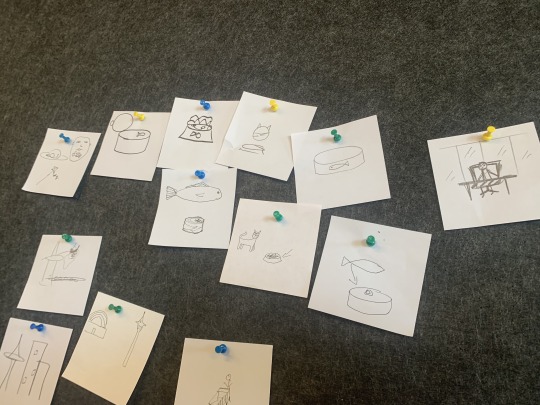
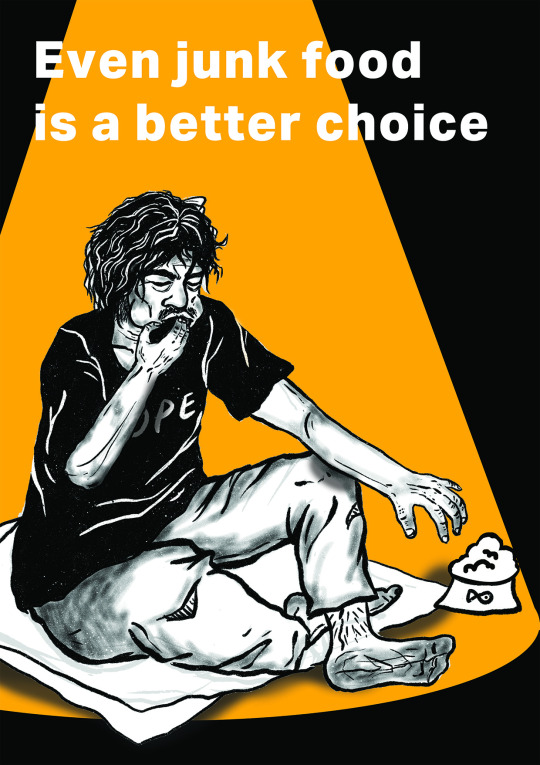
I chose cat food as my subject and described a picture of the homeless engorging pet food on the street. No one seems to care about what do the homeless eat and where could they get any food. Our parents always say to eat less junk food while for the homeless, even junk food is a better choice since that is the food for people rather than animal.
<3>Reading:
Here are some key facts about inequality in New Zealand I find in the reading.
-New Zealand is now a country where, across all adults, the top 1 per cent owns three times as much wealth as the poorest 50 per cent.
-From the mid-1980s to the mid-2000s, the gap between the rich and the rest widened faster in New Zealand than in any other developed country
-The average household in the top 10 per cent of New Zealand has eight times the income of one in the bottom 10 per cent
-The top 1 per cent of adults own 16 per cent of the country’s total wealth, while the bottom half put together have just over 5 per cent. (Inequality of opportunity, status, rights and participation
Not only does income determine people’s ability to afford the basics of life, its absence also limits their access to opportunities, experiences, security and participation in society.)
-New Zealand has between 120,000 and 260,000 children living in poverty (depending on the measure used), 12 and one of the world’s worst records of child health and well-being, with alarming rates of preventable diseases amongst children.
-New Zealand has between 120,000 and 260,000 children living in poverty (depending on the measure used), 12 and one of the world’s worst records of child health and well-being, with alarming rates of preventable diseases amongst children.
-caregivers were poorly paid precisely because their industry is staffed predominantly by women. Often the skills needed in these kinds of occupations, such as nursing and childcare, are not given the same weight as ‘male-type skills’.
-The unemployment rate for Pacific people in the past three years has consistently been two to three times higher than the general population’s rate; in the words of a recent Salvation Army report, ‘Pacific people appear to have been hit more severely by the effects of [the global financial crisis] than other New Zealanders.’
-Around 790,000 New Zealanders below the poverty line, amongst whom more are women than men, and a great many are children. Many elderly people also live close to the poverty line, in addition to those who are below it. And against these figures can be set the 29,000 people who hold 16 per cent of New Zealand’s wealth or the 13,000 New Zealanders who have incomes over $250,000.
<4>Visual Rhetoric:
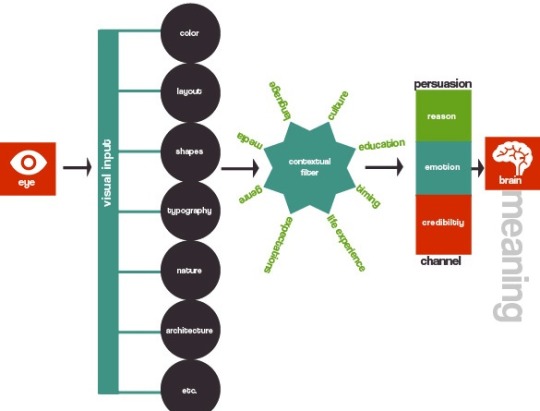
Visual rhetoric, in a nutshell, refers to how we are persuaded by the things we see. It refers to how we interpret and make meaning out of the subject we want to express. It’s “observing, in any case, the available means of persuasion.”
BASIC DESIGN PRICINPLES:
1. Color:
monochromatic: tints of a single hue
complementary: opposite
Analogous: right next to each other on the color wheel.
2. typography:
3.Contrast: Contrast occurs when you place two elements in opposing ways. This helps draw the eye and create a focal point within your design.
4.Hierarchy:
Visual hierarchy is the arrangement or presentation of elements in a way that implies importance. Thus, it provides a direction for your eyes to move (from most important to least important).
Here are some ways to include hierarchy in your design:
Alignment
Color & contrast
Leading lines
Negative space
Perspective
Proximity
Repetition
Rule of odds
Rule of thirds
Size & scale
Spacing
Typographic hierarchy
5. pattern/shapes:
Shapes help create a path for the eye to follow as it scans the poster. Shapes can also effect moods. Softer shapes with curves, circles and organic lines can create a more fluid and relaxed mood. Triangles, squares and other geometric shapes with strong, sharp edges can create an entirely different mood.
6. balance:

<5> research of posters:
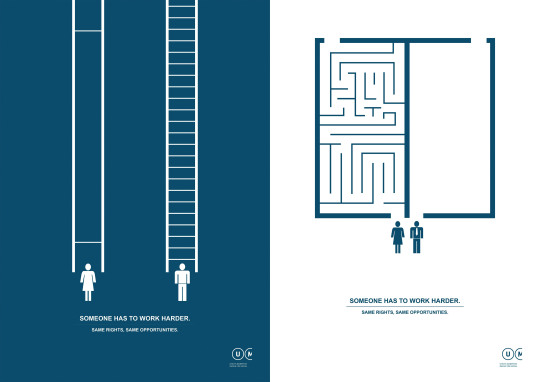

Source: Manifesta Utilità https://www.behance.net/gallery/2598519/Manifesta-Utilita-human-rights
In my opinion, this series of posters about gender inequality is full with simple while powerful ihi. The contrast between men and women facing different situations in their life is vivid and clear. The color composition and good use of positive and negative space make it logical and believable since It’s more like a clear description of social facts rather than emotional expression. Thus I feel unfair and unsatisfactory towards such inequality between men and women.
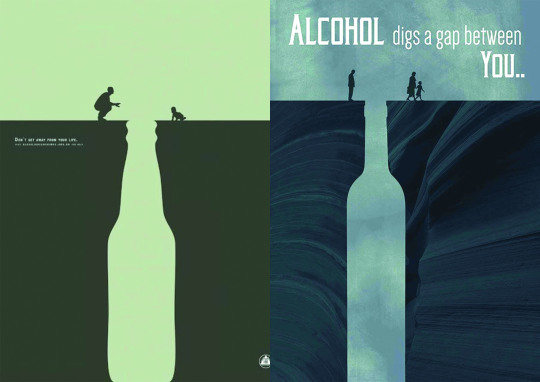
source1: Rio de Janeiro, RJ, Brazil; http://ctrlpels.blogspot.com/
source2: Anti alcoholism posters Hussein Reslan
https://www.behance.net/gallery/20173543/Anti-alcoholism-posters
Ihi: The designer uses the negative space to shape a frame of a wine bottle which also looks like a gorge. Its strong visual hierarchy is leading you firstly noticing the man and his baby then to the bottle of wine. The composition of this picture is simple but impressive.
wehi: the poster makes me feel sad, dangerous and even a little bit regretful even if I do not have drinking problems. It’s just sad to see the man is get away from his family and make the viewer desirable to change, to quit drinking.

source: Gunshake: An Anti-racism poster; Dialogue Design studio https://www.behance.net/gallery/2093108/Anti-racism-poster
ihi: the wild red background color is very prominent and also a metaphor of blood. Contrast here is not only about the black and white colors, but also the two friendly people who are holding hands while actually want to kill each other. Such an excellent metaphoric imagery.
wehi: the red color and guns make me feel sad, scary, worried, uncomfortable, I want to stop them, to stop racism and get rid of the scary situation to real friendship.
0 notes
Text
[Fresh Review] LCD Soundsystem - American Dream

I like LCD Soundsystem. But I don’t love them. Since 2002, LCD Soundsystem has released 4 solid records, but I’ve never loved one of them from front to back. Don’t get me wrong, LCD Soundsystem are absolutely a legendary, “seminal” genre-defining electronic-dance-rock band, but for some reason, I’ve never been able to appreciate them for more than just the parts of their sum. And yes, you read that correctly.
A quick history. In 2005, front-man and indie demi-god James Murphy gave us their self-titled debut, LCD Soundsystem, which to me, is a mostly unlistenable piece of synth-rock besides a few enjoyable, tongue-in-cheek numbers (“Losing My Edge,” “Tribulations”). Omg but the production is soooo good critics will say. Eh. If it doesn’t hit me, it doesn’t hit me. In 2007, we got arguably their strongest output in Sound of Silver, which gave us gems like “Someone Great,” “New York, You’re Bringing Me Down,” and arguably the greatest song of all time, “All My Friends.” Three years later, This Is Happening brought similar highs (“Dance Yrself Clean,” “Home), but also brought forgettable, unlistenable tracks (“Drunk Girls,” “One Touch”). Add in a few EPs and one-off singles, and that pretty much brings us to 2017 with American Dream.
For better or worse, not much has changed since 2002. Murphy and Co. are still writing sardonic, yet passionate turntable-rock music, but with the same sort of hit or miss flavor you can expect from an LCD record. So why is it so hard for them to write a flawless record when they clearly have so much potential? The thing is, LCD has a formula that everyone knows. They make a beat, put it on repeat for an incredibly long period of time (the average song length is 7 minutes), and progressively add layers of instrumentation to in until it inevitably builds into a ear-warming resolution. While it’s a smart formula, it’s incredibly hit or miss. They either risk boring the hell out of their audience for a good chunk of the record (cough cough “Black Screen”) or they create a magical moment that is able to hold your attention for a seemingly indefinite amount of time until you forget who you are. That to me, is not only American Dream in a nutshell, but every single LCD album in a nutshell. Half the tracks are holy-grail how the hell is this so good and half the tracks are actually quite hard to make it all the way through. On this record, you could literally eliminate 50% of the record and it’s be my album of the year. That’s how polarized this record is. So let’s dive in.
Oh, baby. Sorry, forgot the quotes. “Oh baby” kicks of the album with a gorgeous echo-ing piano line and a familiar synth groove. With lines as pained as “oh sugar / give in to me” and “please baby please / my love life plays for me,” it’s clear this saccharine, slowburner is a break-up song of things better left unsaid. It’s also a really awesome opening song.
After the mostly unlistenable Talking-Heads derivative that is “Other Voices,” we get the gorgeous “I Used To,” a song that’s beauty is subtle but powerful. Stuck together by a haunting bassline, repetitive bleep-bloops, crashing cymbals, and ultimately a searing guitar solo, this track has successfully buried itself into my head with the torturous resolution of “I’m still trying to wake up.” While the rest of the album is a series of hit or miss tracks (“Change Yr Mind” is does nothing for me), I’d be remiss to not call out the absolute 15 minutes of perfection that is “How Do You Sleep” into “Tonite,” two songs that belong on the 2025 LCD Soundsystem double-reunion Best-Of album. “How Do You Sleep,” is the “Blood On the Leaves” on American Dream. Led entirely by tribal-influenced drums and a frantic string arrangement, the first five minutes will literally make your skin crawl from anxiety and tension. Finally --- and I mean finally --- a massive synth line comes in that will explode your eardrums if you’re not ready for it. But wait! As an impossibly cool-sounding Murphy sings about a vindictive friendship (“I remember when we were friends / I remember calling you friend,” the instruments continue to build, until, like typical LCD fashion the song bursts wide open with the sweltering addition of Pat Mahoney’s crashing drums. The remaining 3-4 minutes seem to suspend in space; as if life would be okay if it existed in this moment forever. It’s potentially the apex of LCD’s career and something I am absolutely ecstatic to see preformed live.
“Tonite” similarly brings the heat, with the caustic flavor a-la “Losing My Edge” mixed with the techno flavor of a Daft Punk b-side. While the whole song is essential, there is something truly special about the way the song builds with anxiety toward the end, with a breathless Murphy screaming, “you hate the idea that you’re wasting your youth / that you stood in the background until you got older.” It’s potentially my favorite single verse in their entire catalog, and it’s single-handled due to Murphy’s vocal delivery and punchy lyrics. Absolute frisson.
When we zoom out on this 10-song record, it’s hard not to applaud their effort. We have a fairly cohesive album with a wide diversity of different song types that is sure to please everyone in some way. We have a choppy, punk-rocker (“Emotional Haircut,”) an epic slow-burner (“American Dream”), an 80s rock call back (“Other Voices,”), and even a dance-hall stunner in “Tonite.” But disappointingly, for me, I simply can’t get from minute one to minute 68 without the desire to press skip. I guess looking back at their previous output, I shouldn’t be surprised.
seven out of ten
2 notes
·
View notes
Text
Research + Sources
In the UK 60% of 18 to 34-year-olds say that they often feel lonely
The lonely society?, 2010
https://www.mentalhealth.org.uk/sites/default/files/the_lonely_society_report.pdf
In the US 46% of the entire population feel lonely regularly.
At least two in five surveyed sometimes or always feel as though they lack companionship (43%), that their relationships are not meaningful (43%), that they are isolated from others (43%), and/or that they are no longer close to anyone (39%).
Cigna U.S. Loneliness Index, 2018
https://www.multivu.com/players/English/8294451-cigna-us-loneliness-survey/docs/IndexReport_1524069371598-173525450.pdf
You can be filled with bliss by yourself and hate every second surrounded by friends.
Country roads, take me home… to my friends: How intelligence, population density, and friendship affect modern happiness, 2016
https://www.ncbi.nlm.nih.gov/pubmed/26847844
A common stereotype is that loneliness only happens to people who don’t know how to talk to people or how to behave around others.
New Research Finds Lonely People Have Superior Social Skills, 2015
https://www.npr.org/2015/06/26/417840320/new-research-finds-lonely-people-have-superior-social-skills
The growing problem of loneliness, 2018
https://static1.squarespace.com/static/531897cde4b0fa5080a9b19e/t/5ab52956352f534a09fea2c6/1521822038969/the-growing-problem-of-loneliness.pdf
But population-based studies have shown that social skills make practically no difference for adults when it comes to social connections.
New Research Finds Lonely People Have Superior Social Skills, 2015
https://www.npr.org/2015/06/26/417840320/new-research-finds-lonely-people-have-superior-social-skills
Money, fame, power, beauty, social skills, a great personality – nothing can protect you against loneliness because it is part of your biology.
Elucidating the genetic basis of social interaction and isolation, 2018
https://www.nature.com/articles/s41467-018-04930-1
Loneliness. Human Nature and the Need for Social Connection, 2008
https://www.amazon.de/Loneliness-Human-Nature-Social-Connection-ebook/dp/B00421BN3Q/ref=sr_1_1?ie=UTF8&qid=1540372258&sr=8-1&keywords=Human+nature+and+the+need
Loneliness makes you pay attention to your social needs.
#How Loneliness Begets Loneliness, 2017
https://www.theatlantic.com/health/archive/2017/04/how-loneliness-begets-loneliness/521841/
Your body cares about your social needs because millions of years ago it was a great indicator of how likely you were to survive.
#Loneliness Matters: A Theoretical and Empirical Review of Consequences and Mechanisms, 2010
https://www.ncbi.nlm.nih.gov/pmc/articles/PMC3874845/
#Loneliness Across Phylogeny and a Call for Comparative Studies and Animal Models, 2015
http://journals.sagepub.com/doi/abs/10.1177/1745691614564876
You were born into groups of 50 to 150 people, which you usually stayed with for the rest of your life.
#Evolution and Human Behavior, 2018
https://www.sciencedirect.com/science/article/pii/S109051381730209X
To avoid being outcasted by your group, our bodies came up with social pain.
#Loneliness. Human Nature and the Need for Social Connection, 2008
https://www.amazon.de/Loneliness-Human-Nature-Social-Connection-ebook/dp/B00421BN3Q/ref=sr_1_1?ie=UTF8&qid=1540372258&sr=8-1&keywords=Human+nature+and+the+need
The loneliness epidemic we see today really only started in the late Renaissance. (Individualism)
#The Renaissance and Individualism, 1930
https://www.jstor.org/stable/25012777?seq=1#page_scan_tab_contents
#Individualism, 2018
https://www.britannica.com/topic/individualism
#The Renaissance, individualism and the portrait, 2012
https://www.tandfonline.com/doi/abs/10.1016/0191-6599%2894%2900263-F?journalCode=rhei20
This trend accelerated during the industrial revolution. (Modernisation)
#Loneliness. Human Nature and the Need for Social Connection, 2008
https://books.google.de/books?id=w8pWZ2AGI4MC&pg=PA53&dq=Loneliness+industrial+revolution&hl=de&sa=X&ved=0ahUKEwjxquvdkPLfAhVGbVAKHaQmC20Q6AEIQjAD#v=onepage&q=Loneliness%20industrial%20revolution&f=false
Quote:
"The importance we assign to our place within a network of family and social relationships began to erode with the dawn of the industrial revolution."
In the US, in the mean number of close friends, dropped from 3 in 1985 to 2 in 2011.
#Social Isolation in America: Changes in Core Discussion Networks over Two Decades, 2006
http://happierhuman.wpengine.netdna-cdn.com/wp-content/uploads/2014/06/P13.-Social-Isolation-in-America-Changes-in-Core-Discussion-Networks-over-Two-Decades.pdf
Related corrections
Errata: Social Isolation in America: Changes in Core Discussion Networks over Two Decades, 2008
http://journals.sagepub.com/doi/pdf/10.1177/000312240807300610
Critical review:
#Small networks and high isolation? A reexamination of American discussion networks, 2011 http://www.academia.edu/1624984/Small_networks_and_high_isolation_A_reexamination_of_American_discussion_networks
#Cigna U.S. Loneliness index, 2018
https://www.multivu.com/players/English/8294451-cigna-us-loneliness-survey/docs/IndexReport_1524069371598-173525450.pdf
Summary:
Somebody to talk to: According to the Cigna Index, 7% of the Americans always feel like there was no one to turn to and 8% always didn’t feel close to anyone anymore. Additional 29% sometimes felt like there was no one to turn to, while 31% sometimes felt like they did not feel close to anyone anymore.
Stress that comes from chronic loneliness is among the most unhealthy things we can experience as humans.
#Social Relationships and Health: The Toxic Effects of Perceived Social Isolation, 2014
https://onlinelibrary.wiley.com/doi/abs/10.1111/spc3.12087
#Social Relationships and Mortality Risk: A Meta-analytic Review, 2010
https://journals.plos.org/plosmedicine/article?id=10.1371/journal.pmed.1000316
#Cigna U.S. Loneliness index, 2018
https://www.multivu.com/players/English/8294451-cigna-us-loneliness-survey/docs/IndexReport_1524069371598-173525450.pdf
Loneliness is twice as deadly as obesity.
#A Longitudinal Analysis of Loneliness Among Older People in Great Britain, 2012
https://www.tandfonline.com/doi/abs/10.1080/00223980.2011.609572#.UwAGrnEZ7ow
As deadly as smoking a pack of cigarettes a day.
#Cigna U.S. Loneliness index, 2018
https://www.multivu.com/players/English/8294451-cigna-us-loneliness-survey/docs/IndexReport_1524069371598-173525450.pdf
Cited study:
#Loneliness and Social Isolation as Risk Factors for Mortality, 2015
https://journals.sagepub.com/doi/abs/10.1177/1745691614568352
Once it becomes chronic, it can become self sustaining.
#Reciprocal Influences Between Loneliness and Self-Centeredness: A Cross-Lagged Panel Analysis in a Population-Based Sample of African American, Hispanic, and Caucasian Adults, 2017
http://journals.sagepub.com/doi/10.1177/0146167217705120
When you are lonely, your brain is much more receptive and alert to social signals. (source displayed in loneliness video (in a nutshell) )
#Lonely adolescents exhibit heightened sensitivity for facial cues of emotion, 2017
https://www.ncbi.nlm.nih.gov/pmc/articles/PMC5985447/
The part of your brain that recognizes faces gets out of tune.
#Perceived social isolation is associated with altered functional connectivity in neural networks associated with tonic alertness and executive control, 2016
https://static1.squarespace.com/static/531897cde4b0fa5080a9b19e/t/596e4dc8725e25e6967a2264/1500401099203/perceived-social-isolation-is-associated-with-altered-functional-connectivity-in-neural-networks-associated-with-tonic-alertness-and-executive-control.pdf
#The Science of Loneliness, 2014
https://www.psychologytoday.com/intl/blog/cusp/201408/the-science-loneliness
#Interpreting neutral faces as threatening is a default mode for socially anxious individuals, 2008
https://www.ncbi.nlm.nih.gov/pubmed/18729619
The first thing you can do to escape it is to accept that loneliness is a totally normal feeling.
Carl Rogers - “the desire to improve is a precondition for progress.”
#Accepting Loneliness, 2013
https://www.psychologytoday.com/us/blog/pieces-mind/201301/accepting-loneliness
Loneliness is something that deserves more attention.
#The growing problem of loneliness, 2018
https://static1.squarespace.com/static/531897cde4b0fa5080a9b19e/t/5ab52956352f534a09fea2c6/1521822038969/the-growing-problem-of-loneliness.pdf

#A history of loneliness, 2018
http://theconversation.com/a-history-of-loneliness-91542
Millennials love their smartphones
According to a study from 2016, nearly four in ten millennials spend more time on their smartphones than they do engage with people in real life. Millennials are defined here as the generation immediately following Generation X, with the first born in 1980.
Nearly four in 10 Millennials (39%) say they interact more with their smartphones than they do with their significant others, parents, friends, children or co-workers, according to a survey of more than 1,000 people released Wednesday by Bank of America. That’s compared with fewer than one in three people of all ages who say they engage with their smartphones more.
https://www.marketwatch.com/story/millennials-engage-with-their-smartphones-more-than-they-do-actual-humans-2016-06-21

0 notes
Text
Dark, historical, 18+ fun times
About Me Alias: Rottikins, Rotti, Rots. Age: 20+, old enough to drink. As such, only looking for 18+ partners. Gender: Female Personality: I’m awful at describing myself. Ugh. Shy at first but will probably open up after we get talking for a while. I like to think I’m friendly enough? I can be really enthusiastic about things I like and talkative once it gets to the point we are comfortable with one another. About Me: I’m here and don’t know what I’m doing with myself I guess. I’m a lesbian living in Kentucky that enjoys horses, monsters, drawing, and learning about history/mythology. I’m big into developing believable characters and worlds and I seriously love writing and roleplaying. I like detailed, 3-dimensional characters and I can even a little big and silly into the symbolism, tropes (though it's mostly turning them on their head that gets me going), and so forth at times. Do you like to use messengers to chat? Yes yes yes. It’s pretty important to me to have a method of OOC communication. I like to develop friendships with my RP partners and I find that banter about the characters and story tends to lead itself to new ideas and plots naturally. Skype, Discord, and Google Hangouts are all viable options here if we decide we might go places writing together! How long have you been roleplaying? 12+ years? Not entirely sure. About Roleplaying What is the plot (or plots) that you'd like to play out with someone? I like developed characters, dynamic relationships, and lots of building things up together between everyone as we go. I usually like my stories a bit on the darker side of things, and have a love of the ugly and the gross. I have a variety of character types I like to play and would prefer if you do as well. I like flexible partners as I try to be flexible myself.
>>>*>*>The plot I’m most interested in currently is something heavily inspired by the show Vikings, but I don’t really want to role-play out the actual characters from the show or anything. I am looking for a MxM plot where one of the characters is a religious man (monk, priest, or maybe just some average Joe who believes God is Great) ends up enslaved by a Northman warrior. The two learn about each others cultures and become romantically involved later down the line. Of course we can involve other characters and plots in and around all of this. I don’t really mind what end of the relationship I play here, as I’ll probably end up dragging my other Viking-esque type characters into it either way, so you have your pick! The world would be Earth, but with maybe a touch more magic than Earth. So some magic spells, strange rituals, and maybe some monsters, but probably not magically drenched if that makes sense? Yeah! <*<*<<<
Historical fantasy of any kind is really my biggest want all the time. I like mixing historical settings with fantastical elements. Some of my favorite time periods include 20s, 50s, American Civil War, American Revolutionary War, Ancient Egypt, Viking Age, Ancient Rome and Post Civil War/Old West. If you have something in mind you don't see here feel free to hit me up.
Crime roleplays. Gangs, mobsters, drug lords, that kind of thing. Particularly something dirty with 1800s London (though maybe it’s not actually London) thieves perhaps.
Post apocalypse.
Sc-Fi (soft)
Werewolves!
Monsters. Especially monsters in odd pairings with humans or the like.
PIRATES!
Mid to low fantasy, MAYBE. But generally not. I’m sort of bored by it unless it’s got some sort of twist or something is different about it. Generally nothing too Tolkien-esque with pretty drifty elves and such.
I’m not too big on fandom role-play, but I may be swayed. I’ve only ever done one before in my life. I don’t ever role-play fandom characters however, and I’m strictly an OC within a fandom universe type of person. Usually these universes are the kind that are big and with a lot of lore. I may be interested in Fallout, Harry Potter, Skyrim, and maybe a few others here and there but not much else.
How often do you generally post? Every day, at least once but I can also do multiple times a day. Depends on how busy I am. I like to RP with people who post fairly often though, I find that more regular replies help to keep me engaged and coming up with fresh ideas. If you’re a once a week role-play reply sort of person then that’s not what I’m looking for, basically. How much do you generally post? As much as I feel is needed for the situation. Sometimes I’m writing multiple characters or I need to establish a setting and it’s a lot and it’s wordy. Maybe there’s an action scene going on and my character is distressed. I’m not the sort that’s going to fluff up posts where our characters are having a rapid conversation with useless filler though. In a nutshell, as much as I deem fit for the situation. Do you like to write in first person or third person? Third person. Don’t do much else. I have experimented with first person for poopies and smiles in the past though. Who are your favorite playbys (PBs)? I don’t use playbys. I prefer to draw my characters to map out their appearances. There may be famous actors or models that I occasionally reference for aspects of my character’s faces or bodies, but rarely are they exactly what the character looks like entirely. I find as a general rule actors are too pretty for my characters though. I like playing people that aren't always perfect looking. I don’t mind if someone else uses playbys though, as long as you don’t mind I don’t! What playbys (PBs) do you hate? N/A What rating are you comfortable with? 3-3-3. I’d actually prefer you didn’t contact me if you aren’t comfortable with things being rated R. I’m not asking for sex, blood, guts and gory all the time, but some of my characters can be inappropriate and so forth. I also just don’t like to feel restricted in my writing practices in general. How do you feel about writing out graphic scenes such as violence, drug use, and sex? I’m good with it all, and I actually like a bit of smut now and then, but not constantly. Porn without plot is not my cup of tea. Violence and gore is one of my most favorite things to write for sure too, and I might get a bit too enthusiastic about it at times but you can always tell me to tone it down. I have a few restrictions but they are pretty much the general no-go's for most people, and we can talk about all of that when we get down to business (to defeat the Huns). Final Statement How do you want to be contacted? You can just PM me on here, but you’d probably have a better time emailing me. After some talking I'll drop my instant messengers for you to use and stuff. EMAIL: [email protected] Anything else?
Sorry if this seems picky I just know what I like and what I don't like at this point in my RP career. I hope no one is turned off by it! I'm not too interested in sites either, so please unless you have something really good don't suggest them to me.
I will not roleplay with someone that is not comfortable roleplaying homosexual pairings. I do M/F, F/F, and M/M. My characters are of all kinds of sexualities and have all sorts of preferences. If you don't have the desire to roleplay with these types of characters then I don't have any desire to roleplay with you. Sorry!
If you’re big on world building and comfortable with playing more than one character in a given story then THAT WOULD MAKE ME SUPER EXCITED TOO.
It would be super swell if you were comfortable with both male and female characters. You can have a preference, just be capable of playing both? Yeah!
4 notes
·
View notes